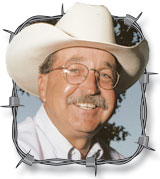What makes a cowman?
Many men own cows. Many men love cows. Yet, not all are, successfully, cowmen. It has been sort of a second profession, for me, meeting these people, seeking the components of the successful ones, the happy ones.
I’ve met them on the show circuit, on farms, on ranches; in tattered overalls and brogans, and in tailored trousers and high-heeled boots. They all possessed a great number of the same characteristics, otherwise, they wouldn’t have been cowmen. There are two primary sentiments.
They love the land. Above and beyond all else, they are close to the soil, or want to be. They possess a love for the bovine species. Loving the land, they are aware of the necessity of paying for it and, to do this, cows are their first choice.
I recall some years ago of talking with a well-educated rancher who owned many thousands of cows. His home was on a wild plain. Many miles of dusty road lay between him and the nearest town.
“What keeps you here?” I asked. “Is it the money from the cattle?”
“Money?” he echoed, apparently surprised at the thought. “Certainly not. I’d be many times better off with the money from the ranch invested in, let’s say, the brokerage business. No, it certainly isn’t the money, with the price of cattle as low as it is now (1955).”
He paused, then continued: “The land. I think it’s the land I like, the challenge of the land. It’s a constant battle with the elements, the mesquite, the things that threaten the herd.”
He could have possessed a major business enterprise, in any of the world’s great capitals, that he chose. But he chose an austere plain, where nature had equipped her vegetation with claws and restricted her water. He loved his land, and his cows which used it.
In the heartland of America, where acreages are relatively small, it is possible for any man who so desires to own a farm and his own cows. Many are the joys of such a life. Few satisfactions are greater than cultivating the breast of your own land, harvesting its fruits, storing it against the howling winds of winter and carrying it to your herd as a loving mother might feed her young.
To see the first white faces peering from the clumps of grass where their mothers have hidden them, to say to yourself, “They are mine; my sweat bought their mothers and this land they live on,” is surely one of life’s finest reasons to exist.
Yet, among the best cowmen I ever met are men who never owned an acre of ground, and never expected to, who have never bought their first cow, and probably never will. These men are the cowboys, the men of the West whose fathers handed down a tradition and who know not how to, nor care to, break that tradition.
How remarkable to see a wagon boss arise at 3 or 4 a.m. from his bedroll on a line shack floor, reach first for his hat, then his boots, pull them on and stalk for the coffee pot. The silver tinkle of his spurs is an alarm to his men and they throw off their blankets, reach first for their hats, then their boots, and follow.
Wordless still, they eat, head for the corral and wait their turn as the wagon boss yells out, “Name your horses,” ropes and leads them out of the herd, then saddle and ride out under star glitter to await first light and a drive.
By noon they have put in a city man’s eight hours; yet, dust-choked and tired, they may continue until dark, working on another man’s land, with another man’s cows – not for money, but for love of land and cows.
They can spot a sick cow, as far as they can see her, by the way she stands or lies, if she has a calf, or is having one. Their sole aim in life is a good calf crop, fat and well sold. And a repeat of the same next year.
I know but a few cow owners who would not be happier as cowboys, were it possible for them to adapt to the simple, but hard, life of the latter. Some are not constitutionally suited, others not mentally suited; others merely want the prestige of owning cows, not of working them, of knowing what is on their insides, what makes them breed for better or worse, and bawl and suckle and carry on life’s cycles.
My observations are that the greatest progress in the bovine world has come, generally speaking, not from the small farmer-rancher (although his contribution is not to be overlooked), but from a judicious combination of cowboys and successful businessmen.





